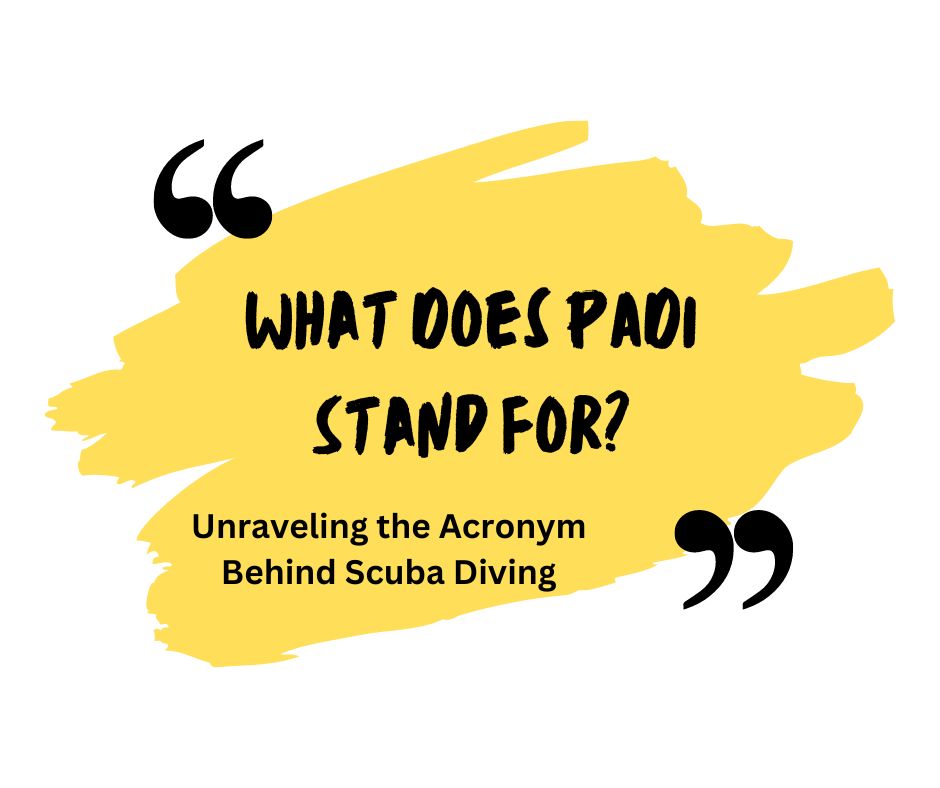PADI stands for “Professional Association of Diving Instructors.” It is a well-known and globally recognized organization that provides scuba diving training and certification. PADI offers a wide range of courses for divers of all levels, from beginners to experienced divers, and its certifications are highly regarded in the diving community. PADI’s mission is to promote safe and responsible diving practices while encouraging people to explore and appreciate the underwater world.
If you’ve ever been interested in scuba diving or are already a diver, you’ve probably heard of the letters “PADI.” What does PADI mean, though, and why is it so important in the world of scuba diving? This article will go into great detail about the letters PADI and what they mean.
Understanding PADI
PADI’s full name is “Professional Association of Diving Instructors.” It is the best scuba diving training company in the world, and its goal is to make sure that divers of all levels have safe and fun dives.
The History of PADI
John Cronin and Ralph Erickson started PADI in 1966. They were both big fans of scuba diving. Their goal was to make scuba diving easier to get into and safer by creating standardized tools and training programs. With over 6,600 PADI Dive Centers and Resorts around the world, PADI is now a major player in the diving business.
PADI’s Role in Scuba Diving
Providing Quality Training
PADI’s main goal is to provide excellent scuba diving instruction. They have made a complete course that takes divers from the very beginning to the expert level. PADI classes teach important things like dive theory, how to stay safe, and how to care for the environment.
Global Recognition
Certifications from PADI are respected and known all over the world. Because of this, divers can experience underwater sights in many different places without having to retrain or get new certifications. A PADI certification lets you dive in any place underwater, like the clear seas of the Caribbean, the colorful reefs of the South Pacific, or the exciting cenotes of Mexico.
Eco-Friendly Initiatives
PADI is dedicated to protecting the underwater world. They actively encourage divers to do things that are good for the environment and offer programs like the Project AWARE Foundation to get divers involved in protecting the ocean. Divers are urged by these programs to take care of the ocean and help protect and preserve fragile ecosystems below the surface.

FAQ: Answers to Common Questions
Q1: Can I get a PADI certification online?
A1: Yes, PADI offers eLearning programs, allowing you to complete the theoretical portion of the course online. Afterward, you can complete the practical training with a certified PADI instructor.
Q2: Is PADI the only scuba diving certification agency?
A2: No, there are several scuba diving certification agencies, including NAUI, SSI, and CMAS. Each has its own curriculum and certification process, but PADI is the largest and most globally recognized.
Q3: How long does it take to become a certified PADI diver?
A3: The time required to become a certified PADI diver varies depending on the course. An Open Water Diver course typically takes about 3-4 days, while more advanced certifications can take longer.
Q4: What is the difference between PADI and other certification agencies?
A4: The main difference is in teaching methodology and materials. Each agency has its own approach to scuba training. PADI is known for its user-friendly materials and widespread availability.
Q5: How much are scuba diving lessons?
The cost of scuba diving lessons can vary widely depending on several factors, including the location, the type of certification agency, the specific course you choose, and whether the lessons are part of a package that includes equipment rental.
On average, you can expect to pay anywhere from $300 to $1,000 or more for entry-level scuba diving certification courses like PADI Open Water Diver or NAUI Scuba Diver. This cost typically covers the course materials, classroom and pool training sessions, and open water dives.
Additional costs may include equipment purchase or rental, certification fees, and any travel expenses if your open water dives are conducted at a dive destination. It’s essential to research and compare prices from different dive shops or training centers in your area to find the best option that suits your budget and needs.
Conclusion
PADI, the Professional Association of Diving Instructors, has played a pivotal role in making scuba diving accessible, safe, and enjoyable for millions of people worldwide. The acronym, which stands for quality training, global recognition, and environmental stewardship, represents a commitment to the underwater world and its conservation. If you’re considering a scuba diving certification, PADI is a name you can trust to guide you on your underwater adventures.
